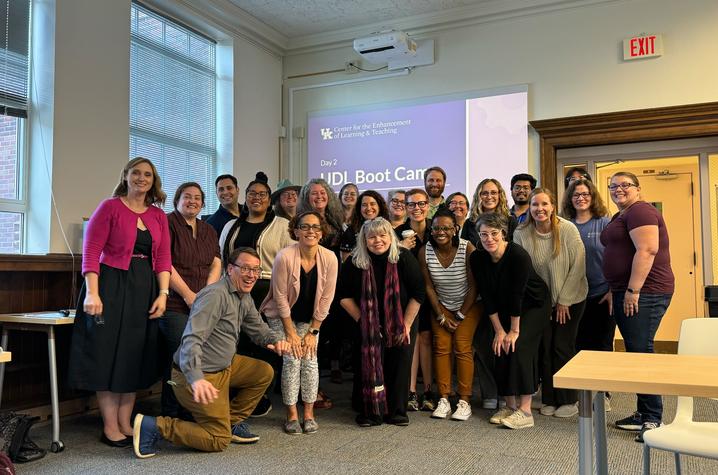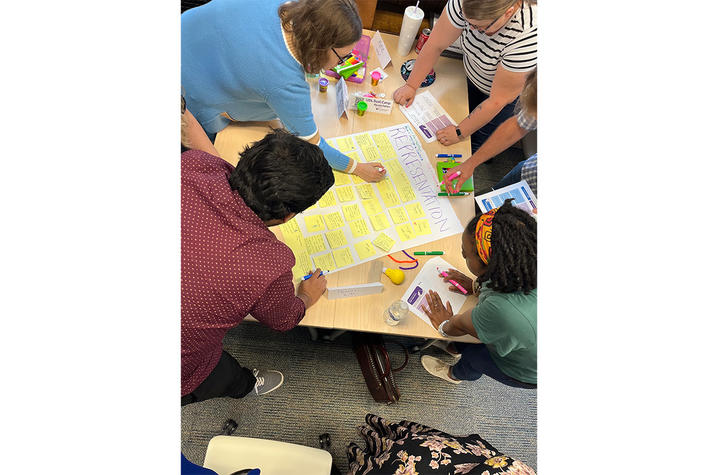UK faculty elevate teaching at CELT UDL Boot Camp
LEXINGTON, Ky. (July 3, 2024) — “Putting students first” is the first key principle of the University of Kentucky’s strategic plan, the UK-PURPOSE. The first objective of that principle is to “[e]nhance and engage in a student-first ethos that inclusively embraces all students…utilizing an equity mindedness lens.” And at the UK Center for the Enhancement of Learning and Teaching (CELT), it has long been a mission to collaborate with instructors, leaders and the larger UK community in the development of inclusive, equitable and learner-centered educational programs.
For many instructors and scholars, this goal is compelling in its push to reinvent what it means (and what it looks like) to learn and be successful in the setting of a particular discipline or profession. A prominent framework for this sort of reflection and educational innovation is Universal Design for Learning (UDL): an inclusive, research-based planning framework that helps educators reduce learning barriers through proactive design.
On May 14-16, faculty from nine colleges participated in the three-day CELT UDL Boot Camp, during which they explored and applied the ideas of UDL using design thinking approaches that asked participants to see their courses through a student-oriented lens.
Many in higher education have noted a sea change in research, practice and the overall discussion on fostering equitable and empowering learning opportunities for all students. Some of these questions concern how to balance the need for flexibility and personalization with the need for scaffolding, support and coherence in learners’ educational programs. Others focus on ways programs and instructors can create equitable opportunities for all students, particularly those who traditionally have experienced barriers to learning and academic success.
Students’ needs and goals are increasingly diverse (though they likely always were), and CELT seeks to reimagine traditional means of teaching and learning to account for this rich tapestry of differences. Educational approaches informed by UDL represent a compelling way to further a student-first ethos using an equity-minded lens.
Participants in the CELT UDL Boot Camp examined major aspects of the UDL framework such as learners’ means of engaging in activities, how course content and information is presented to learners and the options for learners to act upon and express their learning. On the last day of the camp, faculty were given a design challenge that asked them to apply the things they’d learned about UDL to some aspect of their course, which they then presented to the other boot camp participants and CELT staff.
“This boot camp was an energizing and thought-provoking way to start the summer,” said Brenna Byrd, Ph.D., associate professor in the College of Arts and Sciences. “Jennifer Pusateri [CELT senior universal design consultant] masterfully taught a diverse cohort of faculty the history behind UDL, its relevance to inclusive teaching practices, as well as practical examples of how to design learning experiences that are inclusive while remaining rigorous and sufficiently challenging.”
Other participants noted that they finished the program with practical next-steps for their courses and teaching in ways that foreground important learning objectives and meaningful challenges while also creating accessible, flexible and supportive learning environments.
Upon concluding the program, participants were able to apply their experiences toward the CELT inclusive teaching badge. CELT will also be hosting a UDL Boot Camp on July 16-18 for UK staff in student support or instructional support roles and aims to offer similar programs in the future.
May 2024 CELT UDL Boot Camp Faculty Participants:
- Helen Bischoff, Libraries
- Tina Brooks, Law
- Brenna Byrd, Arts and Sciences
- Heather Campbell-Speltz, Arts and Sciences
- Julian Dupuis, Agriculture, Food and Environment
- Amanda Ellis, Public Health
- Lisa Enright, Communication and Information
- Juan Fernandez Cantero, Arts and Sciences
- Whitney Hanley, Education
- Amy Jones Haug, Education
- Kaitlin Key, Nursing
- Nicholas Nguyen, Arts and Sciences
- Katherine Paullin, Arts and Sciences
- Winter Phong, Fine Arts
- Samanta Praneel, Arts and Sciences
- Jill Rappoport, Arts and Sciences
- Jill Schinberg, Fine Arts
- Elizabeth Spencer, Communication and Information
- Jody Stokes-Casey, Fine Arts
- Kakie Urch, Communication and Information
- Olivia Yinger, Fine Arts
As the state’s flagship, land-grant institution, the University of Kentucky exists to advance the Commonwealth. We do that by preparing the next generation of leaders — placing students at the heart of everything we do — and transforming the lives of Kentuckians through education, research and creative work, service and health care. We pride ourselves on being a catalyst for breakthroughs and a force for healing, a place where ingenuity unfolds. It's all made possible by our people — visionaries, disruptors and pioneers — who make up 200 academic programs, a $476.5 million research and development enterprise and a world-class medical center, all on one campus.






